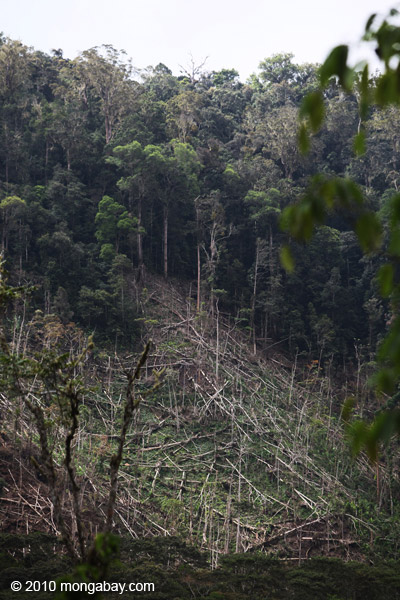 Deforestation for an oil palm plantation in Central Kalimantan. Photo by Rhett A Butler. |
On Monday Indonesia’s House of Representatives moved to establish “North Kalimantan”, a new province in Indonesian Borneo. It also voted for four new districts: Pangandaran in West Java, South Coast in Lampung (Sumatra), and South Manokwari and Arfak Mountains in West Papua (New Guinea). While the moves aim to improve governance by boosting local autonomy, they could make it more difficult for Indonesia to meet its deforestation reduction goals if recent trends — detailed in a 2011 academic paper — hold true.
The study, published last year by researchers at the London School of Economics (LSE), the Massachusetts Institute of Technology (MIT), and South Dakota State University (SDSU), linked an increase in political jurisdictions to a rise in deforestation between 1998 and 2009. The researchers blame the election cycle. Politicians in forest districts appear to often rely on funding from loggers, plantation developers, and miners to fund their campaigns. More campaigns owing to more political units mean more deforestation.
The conclusion is based on analysis of changes in forest cover in different ‘forest zones’ in newly created administrative districts, which increased from 291 to 498 during the “decentralization” movement from 1998 to 2009. The researchers discovered that subdividing a province by adding a district increases the incidence of deforestation within that province by 7.8 percent.
The researchers found that illegal logging — forest felling in ‘conservation’ and ‘protection’ zones where no logging is allowed — increases during the run-up to local elections, but falls sharply in the year after the election, replaced by a steep increase in logging in ‘conversion’ zones. The shift from illegal to legal logging may be a consequence of politicians’ paying back favors — in the form of legal logging concessions — to interests that sponsor their campaigns.
 Logging in the Arfak Mountains, Indonesian New Guinea. Photo by Rhett A Butler. In theory, Indonesia’s two-year moratorium on new concessions in 14.5 million hectares of primary forests and peatlands should help moderate the impact of the new administrative units, but as recent developments in other parts of the country show, local governments aren’t always keen to follow federal government pronouncements in Indonesia. |
“We document a ‘political logging cycle’ where local governments become more permissive vis a vis logging in the years leading up to elections,” the authors wrote. “We find that deforestation in zones where all logging is illegal increases by as much as 42 percent in the year prior to an election…. Illegal logging then falls dramatically (by 36%) in the election year and does not resume thereafter.”
“In the conversion zone, we find a 40% increase in logging in the year of the election and a 57% increase in the year following the election.”
Owing to a relatively small middle class and other factors, local elections in Indonesia are often funded by people and companies associated with extractive industries like logging, mining, and plantation development. This is important because the bupati, or district head, holds a lot of power when it comes to decisions on what land will be used for agriculture and plantations, and whether illegal logging will be tolerated.
More broadly, the findings suggest that unless the link between elections and deforestation is broken, an increase in political units could exacerbate pressure to log and convert forests, potentially undermining the central government’s program to reduce deforestation and peatlands degradation (REDD+). North Kalimantan and West Papua are particularly vulnerable since both regions retain considerable forest cover and already suffer from deforestation.
“To the extent one wants to slow the rate of tropical deforestation, these results matter. They suggest that unless the incentives of local politicians and bureaucrats are taken centrally into account then central or donor driven policies to counter deforestation may be ineffective,” the authors wrote.
“Unless REDD programs are designed taking into account those local actors who currently derive considerable benefits from legal and illegal logging, it is unlikely to be effective.”
CITATION: Robin Burgess, Matthew Hansen, Benjamin Olken, Peter Potapov, and Stefanie Sieber. The Political Economy of Deforestation in the Tropics. London School of Economics. January 2011
Note: This post draws heavily on an earlier mongabay.com post: Election cycle linked to deforestation rate in Indonesia which was published April 14, 2011.
Related articles